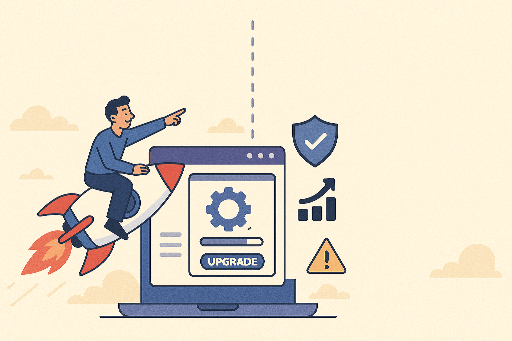Upgrading to a new PHP version often causes anxiety among website owners. In this article, we'll explore why hosting providers insist on PHP updates and how to make this transition as safe and efficient as possible.

G. Ostrov
Why Hosting Providers Insist on PHP Updates
Regular updates to your hosting's PHP version aren't just a whim of providers but a necessity dictated by several important factors:
- Security: Outdated PHP versions no longer receive security updates, making your site vulnerable to cyber attacks. For example, PHP 7.4 stopped receiving security updates in November 2022.
- Performance: Each new PHP version offers significant performance improvements. PHP 8.x runs 2-3 times faster than PHP 7.x, which directly affects your website's loading speed.
- Compatibility with modern technologies: New frameworks, CMSs, and plugins often require current PHP versions to function correctly.
- Server resources: Supporting multiple outdated PHP versions requires additional server resources, increasing costs for hosting providers.
How to Prepare for a PHP Update
Before proceeding with the update, complete the following steps:
- Create a complete backup of your site. This includes all files and the database. It's good practice to create a local copy for testing.
- Check compatibility of your CMS, themes, plugins, and scripts with the new PHP version. Most modern CMSs such as WordPress, Joomla, and Drupal have tools to check compatibility.
- Update your CMS, plugins, and themes to the latest versions that support the new PHP version.
- Check for deprecated code. If you have custom scripts or plugins, they may contain deprecated functions or syntax.
The Painless PHP Update Process
The transition to a new PHP version can be accomplished as follows:
- Sandbox testing:
- Create a test environment with the new PHP version.
- Deploy a copy of your site on it.
- Check the functionality of all major features and pages.
- Phased implementation:
- Many hosting providers allow you to select the PHP version for a specific domain or subdomain.
- Start by updating on a test subdomain (e.g., test.yourdomain.com).
- After successful testing, switch the main domain.
- Switching in the hosting control panel:
- Most control panels (cPanel, Plesk, DirectAdmin) have a "PHP Version Manager" option or similar.
- Select the desired PHP version and apply the change.
- Post-update monitoring:
- Carefully monitor server logs for errors.
- Check the functionality of all key components of the site.
- Be prepared to quickly revert to the previous version in case of problems.
Solving Common Problems When Updating PHP
When transitioning to a new PHP version, the following problems may arise:
- Syntax errors: Some deprecated PHP constructs may stop working. Using code analysis tools, such as PHP Compatibility Checker, will help identify problematic areas.
- Plugin incompatibility: Install only those plugins that are compatible with the new PHP version. Temporarily disable unsupported plugins until they are updated.
- Function issues: Some deprecated functions may be removed or changed. Study the list of changes between PHP versions to know about potential problems in advance.
- Changes in configuration parameters: New PHP versions may have changed default values. Check and, if necessary, update your php.ini or add directives to the .htaccess file.
Benefits of Using the Latest PHP Versions
Despite temporary inconveniences, transitioning to a new PHP version brings many benefits:
- Significant performance improvement: Your site will load faster, positively affecting SEO and user experience.
- Enhanced security: Active security updates protect your site from new threats.
- Access to new features: New PHP versions offer improved syntax and functions that simplify development.
- Increased compatibility: Modern CMSs and plugins are optimized to work with the latest PHP versions.
- Reduced maintenance costs: In the long term, regular updates reduce the risk of serious problems and the cost of fixing them.
Conclusion
Transitioning to a new PHP version is an inevitable step in any website's lifecycle. A properly planned and implemented update will bring significant benefits in performance, security, and functionality to your site. Instead of postponing the update until the last moment, it's recommended to proactively plan the transition and perform it at a convenient time for you, minimizing risks and downtime.
Regular PHP updates are an investment in the future of your online presence, which pays off with improved performance, security, and growth opportunities.
Official PHP website: https://www.php.net/
If you have any problems, write to us, we will help quickly and efficiently!




